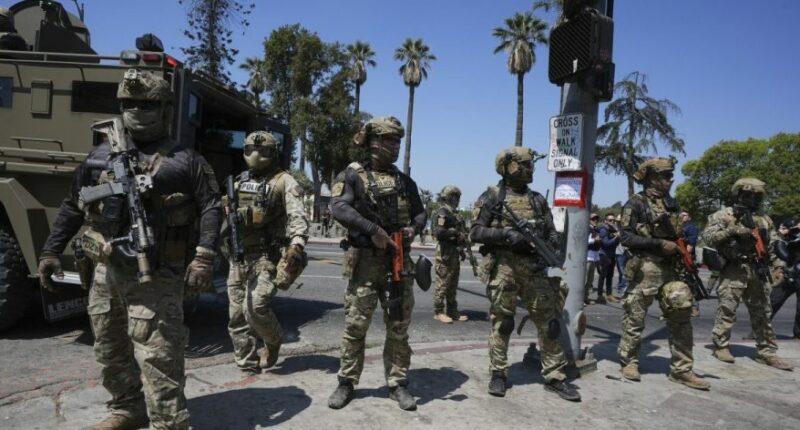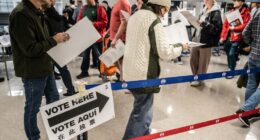Share this @internewscast.com

As President Donald Trump stretches the limits of military involvement on American soil, a discussion has emerged concerning a nearly 150-year-old law that governs when federal troops can become involved in state matters.
On Tuesday, roughly 800 National Guard troops arrived in Washington, D.C., following President Donald Trump’s claim — without evidence — that their presence was necessary to curb crime in the “lawless” national capital. Simultaneously, thousands of miles away, a California judge considers the legality of the president’s recent action to federalize Guard personnel in Los Angeles during protests against immigration raids, questioning if it violated federal law.
Furthermore, Trump has established militarized zones along the U.S.-Mexico border as part of a significant new direction that involves the army in immigration enforcement in unprecedented ways.
The California and Washington instances predominantly revolve around the Posse Comitatus Act, enacted in 1878, which generally restricts the military from executing domestic laws. Experts indicate that in both scenarios, there are explicit constraints on how the law can be applied.
Here is what to know about the law.
Posse Comitatus Act stops military from enforcing US law
The Posse Comitatus Act is a criminal law that prohibits the military from upholding domestic law. It also restricts the military from probing local offenses, superseding local law enforcement, or enforcing specific actions.
There are exceptions to Posse Comitatus, which include a congressional vote or actions taken to protect the Constitution. Additionally, the Insurrection Act of 1807 can trigger the suspension of the Posse Comitatus Act, permitting the president to deploy the military within the country during instances of invasion or rebellion.
There is an exception for the U.S. Coast Guard, which has some law enforcement responsibility. The military is also allowed to share intelligence and certain resources if there is an overlap with civilian law enforcement jurisdiction, according to the Library of Congress.
Law was enacted after Reconstruction era
The law was enacted in 1878 following the post-Civil War era known as Reconstruction. Pro-segregationist representatives in Congress wanted to keep the military from blocking the enforcement of Jim Crow laws that allowed racial segregation.
But the spirit of the law also has roots going all the way back to the Revolutionary War, when the founders of the United States were scarred by the British monarchy’s absolute military control, said William C. Banks, a professor at the Syracuse University College of Law.
“We have a tradition in the United States, which is more a norm than a law, that we want law enforcement to be conducted by civilians, not the military,” Banks said.
That ethos — ingrained in National Guard personnel starting in basic training — becomes especially powerful in the case of the Posse Comitatus Act, because the law has hardly been tested before now, said Steve Vladeck, a professor of law at the Georgetown University Law Center.
“There is no authoritative precedent on exactly where these lines are, and so that’s why over the years the military’s own interpretation has been so important,” Vladeck said.
Law applies to ‘federalized’ troops
The Posse Comitatus Act typically doesn’t apply to the National Guard because members of the Guard report to the governor, not the federal government.
But when Guard personnel are “federalized” they are bound by the act until they are returned to state control, according to the Brennan Center for Justice.
The state of California said in a federal lawsuit that the Trump administration violated the act when it deployed National Guard soldiers and U.S. Marines to Los Angeles following June protests over immigration raids.
The Trump administration has argued that the Posse Comitatus Act does not apply because the president used a provision known as Title 10 to federalize the troops. It allows the president to call the National Guard into federal service when the country “is invaded,” when “there is a rebellion or danger of a rebellion against the authority of the Government,” or when the president is otherwise unable “to execute the laws of the United States.” Attorneys for the federal government also argue that the troops are not enforcing domestic laws and are only acting to protect federal property and agents.
In Washington, by contrast, the president is already in charge of the National Guard and can legally deploy troops for 30 days without congressional approval.
Vladeck said that both deployments over the past three months suggest that the Trump administration “appears to be trying to dance around the Posse Comitatus Act” rather than disregard it altogether.
“There is a lot in the water about the Trump administration being lawless. What is striking is actually how much the administration is trying to wrap itself in the law,” Vladeck said.
Law depends on executive branch policing itself
Beyond the legal exceptions written into the law, there is a practical question of how to enforce it, said Joseph Nunn, counsel in the Brennan Center for Justice’s Liberty and National Security Program.
Because the Posse Comitatus Act is a criminal statute, not a civil one, the U.S. Department of Justice is responsible for prosecution in criminal court, Nunn said.
“It’s premised on the executive branch policing itself,” he said. That leaves unclear legal standing for whether a state government like California’s has a right to sue in civil court in the first place.
The ruling in the California case will likely be a narrow interpretation based on the circumstances of the Guard’s deployment in Los Angeles, Vladeck said. But he said it could still dictate how the administration uses the Guard in other cities like Chicago and New York, where Trump has threatened to federalize troops next.











